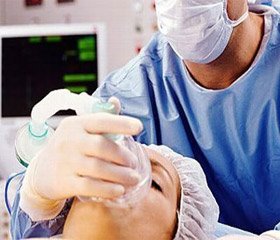Журнал «Медицина неотложных состояний» 1 (64) 2015
Вернуться к номеру
Influence of General Anaesthesia on the Degree of Cognitive Changes in Elderly Patients with Urgent Surgical Pathology
Авторы: Khizhniak A.A., Mykhnevych K.H., Bausov Ye.O., Dubivska S.S. - Kharkiv National Medical University, Kharkiv, Ukraine
Рубрики: Медицина неотложных состояний
Разделы: Справочник специалиста
Версия для печати
cognitive function, general anaesthesia, nootropic drugs, Tiocetam, Cytoflavin.
The article considers the question of saving and restore of basic higher brain functions after surgery under general anaesthesia with subsequent development of methods of their correction at the elderly.
It is well known that general anesthesia reduces brain perfusion, affects intracranial pressure, disrupts the synaptogenesis, induces neurodegeneration, stimulates neuron apoptosis. All this in the future leads to different disorders of higher nervous activity and cognitive dysfunctions. Cognitive dysfunctions are observed after 30 % of surgery under general anesthesia and last up to 3 months in 10 % of cases. Postoperative cognitive dysfunction (POCD) is primarily manifested by memory impairment, speed and logical thinking, attention concentration.
The purpose of the study: evaluation of the effect of general anesthesia on cognitive functions and the development of methods for their correction in geriatric patients with acute surgical pathology of abdominal cavity.
96 patients were divided into 3 groups: 1st group (n=26) — standard treatment (infusion, antibiotics, disaggregants, anticoagulants, analgesics), the average age 74,0±8,9 years, 9 men and 17 women; 2nd group (n=34) — adding of nootropic drugs (Tiocetam 25 ml in bolus, then 25 ml daily in infusion during 7 days, then 2 tablets daily during 30 days), the average age 74,0±7,6 years, 14 men, 20 women; 3rd group (n=36) — adding of Cytoflavin (10 ml in 200 ml 5 % glucose solution 2 times a day during 7 days, starting 30 minutes before the end of surgery, then 2 tablets daily during 30 days), the average age 72,0±7,4 years, 13 men, 23 women. Cognitive functions has been investigated before surgery, for the 1st, 2nd, 5th, 12th, and 30th day by Mini-Mental State Examination (ММSE), drawing clock test (DCT), 5 words test (5WT) by A.R. Luria, Frontal Assessment Battery (FAB), Shulte’s tables test (STT).
The results of research of cognitive functions at elderly patients postoperatively testify to moderate changes of cognitive sphere, but in different degree depending on postoperative treatment. MMSE score at 1st group compared with preoperative level accordingly the stages of investigation was: ‑19,4 % (p<0,05, here and further — compared with preoperative level), ‑20,3 % (p<0,05), ‑10,6 % (p<0,05), ‑7,1 % (p<0,05), ‑2,2 % (p>0,05); at 2nd group: ‑14,3 % (p<0,05), ‑11,5 % (p<0,05), ‑2,6 % (p>0,05), +2,4 % (p>0,05), +4,3 % (p<0,05); at 3rd group: ‑14,1 % (p<0,05), ‑12,4 % (p<0,05), ‑ 1,7 % (p>0,05), +4,7 % (p<0,05) та +7,3 % (p<0,05).
DCT score at 1st group compared with preoperative level accordingly the stages of investigation was: ‑14,5 % (p<0,05), ‑15,8 % (p<0,05), ‑8,7 % (p<0,05), ‑2,5 % (p>0,05), ‑2,1 % (p>0,05); at 2nd group: ‑15,3 % (p<0,05), ‑11,5 % (p<0,05), ‑3,1 % (p<0,05), +3,1 % (p<0,05), +3,1 % (p<0,05); at 3rd group: ‑12,0 % (p<0,05), ‑10,5 % (p<0,05), +1,2 % (p>0,05), +3,2 % (p<0,05), +4,4 % (p<0,05).
FAB score at 1st group compared with preoperative level accordingly the stages of investigation was: ‑17,8 % (p<0,05), ‑19,1 % (p<0,05), ‑10,1 % (p<0,05), ‑5,3 % (p>0,05). ‑0,8 % (p>0,05); at 2nd group: ‑19,7 % (p<0,05), ‑15,7 % (p<0,05), ‑1,2 % (p>0,05), +6,8 % (p<0,05), +11,4 % (p<0,05); at 3rd group: ‑21,2 % (p<0,05), ‑14,3 % (p<0,05), ‑1,8 % (p>0,05), +5,4 % (p<0,05), +9,1 % (p<0,05).
5WT score at 1st group compared with preoperative level accordingly the stages of investigation was: ‑13,4 % (p<0,05), ‑14,7 % (p<0,05), ‑6,3 % (p<0,05), ‑1,3 % (p>0,05), +0,4 % (p>0,05); at 2nd group: ‑14,2 % (p<0,05), ‑15,1 % (p<0,05), ‑5,7% (p<0,05), +1,9 % (p>0,05), +4,1 % (p<0,05); at 3rd group: ‑11,4 % (p<0,05), ‑8,7 % (p<0,05), +1,8 % (p>0,05), +6,0 % (p<0,05), +6,9 % (p<0,05).
STT score at 1st group compared with preoperative level accordingly the stages of investigation was: +14,6 % (p<0,05), +17,5 % (p<0,05), +11,4 % (p<0,05), +5,9 % (p>0,05), +1,7 % (p>0,05); at 2nd group: +8,8 % (p<0,05), +10,1 % (p<0,05), +0,04 % (p>0,05), ‑4,8 % (p<0,05), ‑7,6 % (p<0,05); at 3rd group: +10,8 % (p<0,05), +8,2 % (p<0,05), ‑2,8 % (p>0,05), ‑7,5 % (p<0,05), ‑12,7 % (p<0,05).
On the 30th day 1st group’s results by all tests were reliably the worst, 3rd group’s results by MMSE, DCT and STT were reliably the best.
Conclusion: including of Tiocetam and especially Cytoflavin allows to restore faster cognitive functions after urgent surgery of the abdominal cavity under general anesthesia at elderly.

